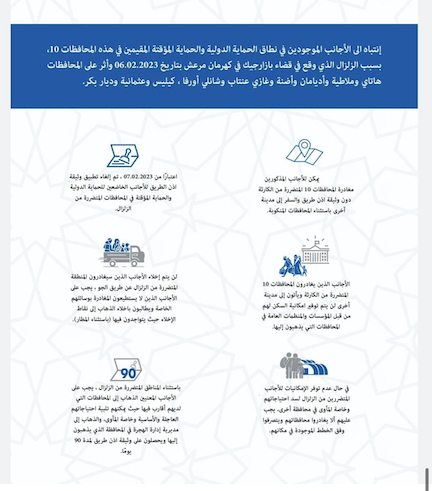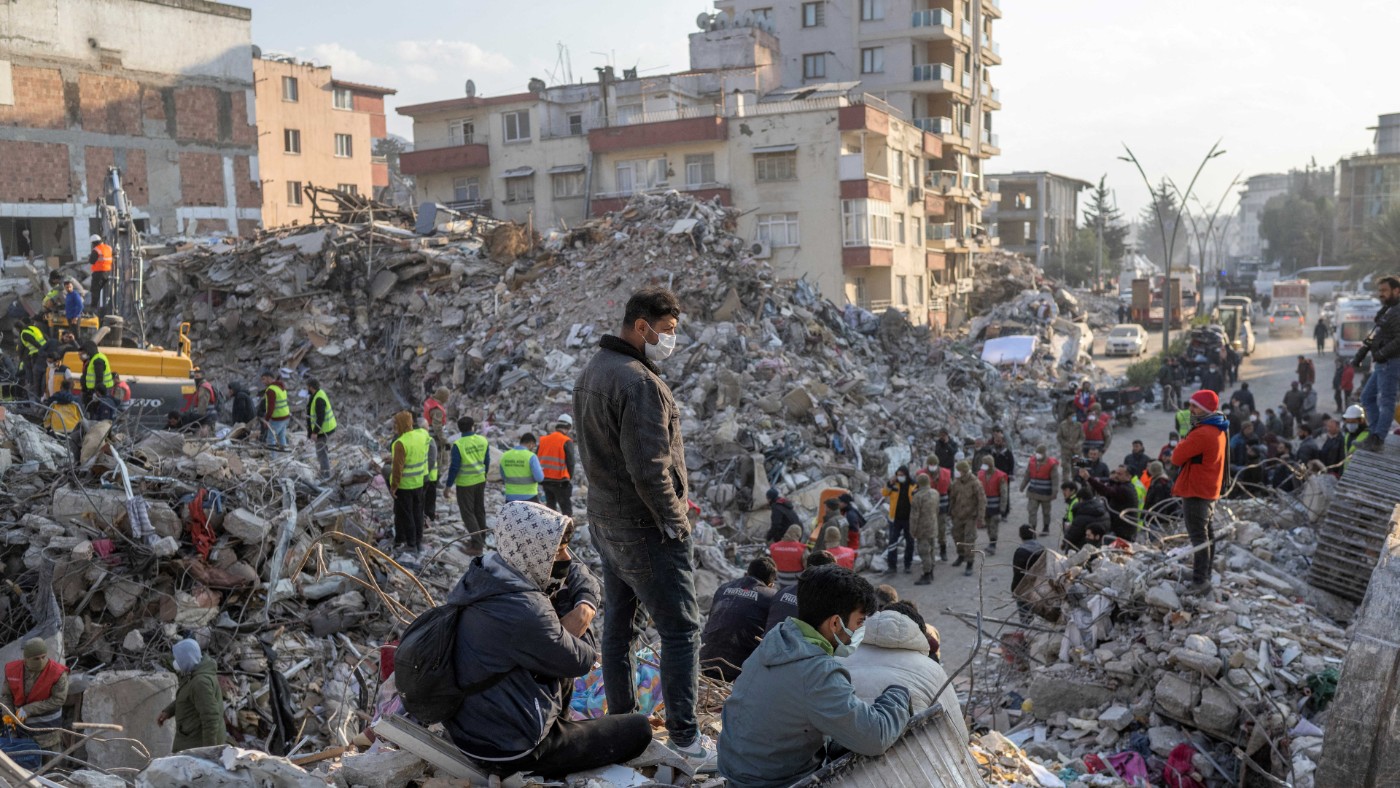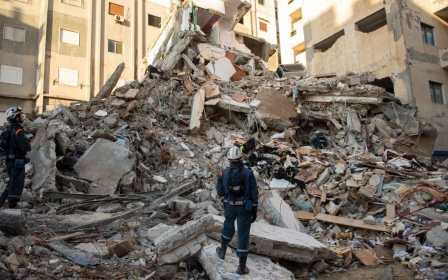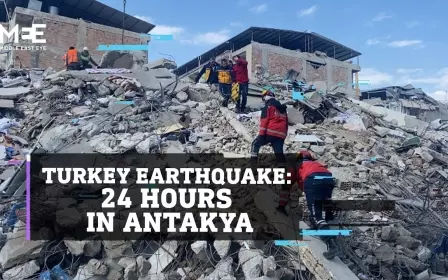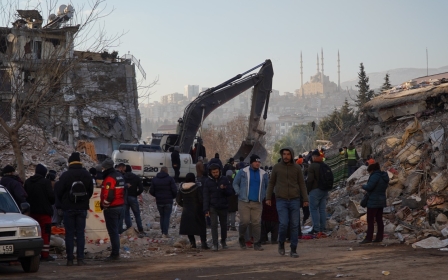Turkey earthquake: Ankara may call for relocation of Syrian refugees from disaster zone
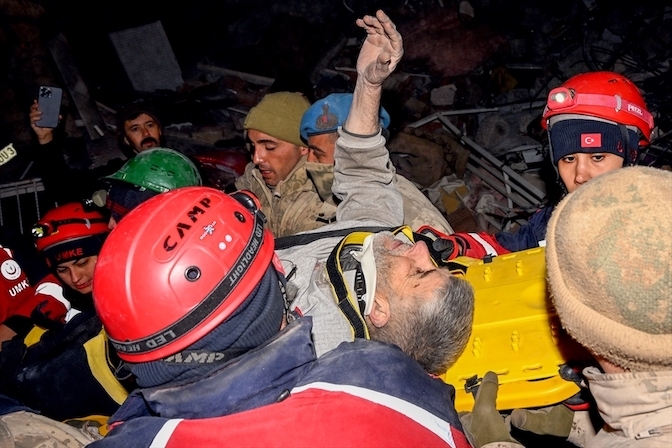
The Turkish government is considering relocating hundreds of thousands of Syrians from 10 of the country's provinces after the twin earthquakes that have so far killed more than 30,000 people in Turkey.
The two massive earthquakes have not simply affected the lives of millions of people in northern Syria. They have caused tremendous destruction in a region where Syrians fleeing their country's civil war had found a new home: southern Turkey.
Syrian sources have told Middle East Eye that the Syrian-Turkish Joint Committee, created in 2019 on behalf of the Turkish interior ministry and the opposition Syrian National Coalition, will soon call for Syrians to relocate to different cities.
One of the sources, speaking anonymously, said the exact number of Syrian casualties in Turkey is not clear yet. They added that the highest number of casualties is expected in the southern Turkish province of Hatay.
'Some neighbourhoods there have been called Syrian towns. These neighbourhoods have been destroyed completely'
- Syrian-Turkish committee source
“As you know, some neighbourhoods there have been called Syrian towns. These neighbourhoods have been destroyed completely,” the source said.
New MEE newsletter: Jerusalem Dispatch
Sign up to get the latest insights and analysis on Israel-Palestine, alongside Turkey Unpacked and other MEE newsletters
A separate Turkish source with knowledge of the situation told MEE that 1,126 Syrian bodies were delivered to Syria through the border last week.
The source said he believes around one fourth of the dead in Hatay are Syrians.
Turkey is the foreign country most impacted by the decade-long conflict in Syria. Over three and a half million Syrians are living in Turkey under temporary protection.
In some border towns, Syrians have become the majority. According to the Turkey-based Association for Refugees, 1.75 million Syrians have been living in the 10 earthquake-hit provinces according to the December 2022 statistics.
The sources also shared the draft of the call put out to Syrian refugees living in Turkey. In it, the Syrian-Turkish Joint Committee of Refugees says that six to 12 months are "needed for the return to normal life in Gaziantep, Kahramanmaras and Antakya".
It continues: "Syrian brothers whose houses are damaged should consider the situation carefully and do what is necessary to live in different regions by his/her means."
Some Turkish citizens in the earthquake region have been evacuated by the Turkish Armed Forces and Turkish Airlines.
For Turkish citizens who do not want to stay in the tent camps that have been set up, the Turkish government will allocate 15,000 Turkish lira (around $800) of relocation support for each family.
According to an image circulated on Turkish social media, purportedly created by Turkey's Presidency of Migration Management, relocation support does not cover Syrians hit by the earthquake.
Similarly, while Turkish citizens in the region are hosted in public buildings like sports and student halls in safe cities in western Turkey, Syrians will not benefit from this programme, according to the document being circulated.
The document adds that while Syrians do not need to get a travel permit from the authorities, once they relocate to another city to stay with relatives or friends who have available accomodation, they would need to register with the authorities for 90-day residence permits.
Officials in the migration management authority told MEE that the document on social media was a draft of a work in progress that had not yet been finalised and put into place. Most photos of the document have been removed from social media sites.
"The actual situation is constantly changing. It takes time to liaise with the many Syrians in the disaster area and determine their situation. Various alternatives are also noted in the process. However, we will take action on Syrians once the situation is clarified,” an official said.
"The biggest handicap for the healthy evacuation of Syrians who have lost everything here is that they do not face the problem of accommodation outside the disaster zone,” the official said.
But Turkish officials have stated that those who want to stay in the disaster zone could be hosted in camps for the earthquake victims.
Some Syrian communication networks and activists also claim that a number of Syrian refugee camps have been evacuated forcefully to serve earthquake victims in Turkey.
MEE has not been able to verify these claims.
Middle East Eye delivers independent and unrivalled coverage and analysis of the Middle East, North Africa and beyond. To learn more about republishing this content and the associated fees, please fill out this form. More about MEE can be found here.


